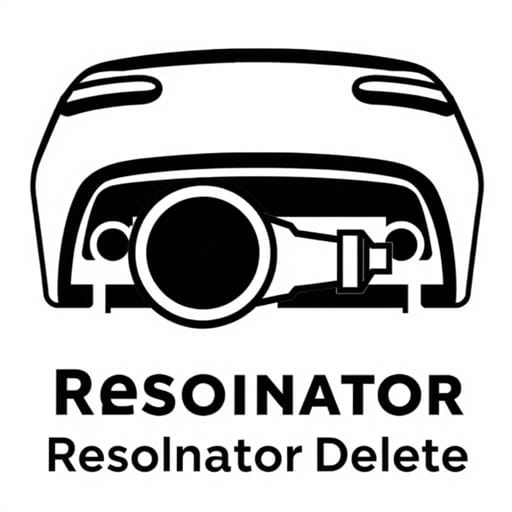Automobile enthusiasts and casual drivers alike often consider modifying their exhaust systems to enhance sound or improve airflow. One such modification is a resonator delete, which involves removing the resonator component from a vehicle’s exhaust system. While this upgrade can lead to a more aggressive exhaust tone and potential performance changes, many wonder: how much is a resonator delete? The cost can vary significantly based on vehicle make, labor rates, and the shop performing the work. Understanding the pricing, benefits, and potential drawbacks can help you make an informed decision.
What Is a Resonator Delete?
The Role of the Resonator
The resonator is a component in the exhaust system typically located between the catalytic converter and the muffler. It works in conjunction with the muffler to reduce engine noise, eliminate certain sound frequencies, and smooth the exhaust tone. Rather than filtering out sound like a muffler, the resonator is designed to cancel out specific sound waves through reflection and tuning.
What Happens When You Delete It?
A resonator delete involves removing this component and replacing it with a straight piece of pipe. This modification alters the vehicle’s sound, usually making it louder and deeper. It may also slightly reduce the weight of the vehicle and, in some cases, increase exhaust flow.
Average Cost of a Resonator Delete
Cost Breakdown
The total cost of a resonator delete depends on several key factors. Here’s a breakdown of average expenses:
- Labor Costs: $50 $150
- Parts and Materials: $20 $100
- Total Cost Range: $70 $250
Some high-end or custom exhaust setups can increase the cost beyond this range, especially for luxury or performance vehicles. On the other hand, basic cars with accessible exhaust layouts tend to fall at the lower end of the spectrum.
DIY vs. Professional Installation
If you have experience with automotive work and the necessary tools, you might choose to perform a resonator delete yourself. In this case, you would only need to purchase a resonator delete pipe or kit, which usually costs between $40 and $100.
However, most drivers prefer hiring a professional mechanic or exhaust specialist, as it ensures proper fitment and weld quality. Labor charges vary based on region and shop reputation but are generally reasonable for this type of job.
Factors That Influence the Price
Vehicle Make and Model
Luxury and performance cars such as BMW, Audi, or Mercedes-Benz often have more complex exhaust systems. This can make the process more time-consuming and expensive. Compact cars, trucks, or common sedans typically have simpler exhaust systems, which reduces labor costs.
Exhaust System Design
Some exhaust layouts make the resonator easier to access, reducing labor time. If the resonator is integrated with other components or located in a hard-to-reach place, the job may take longer and cost more.
Custom Fabrication
In some cases, a shop may need to fabricate a custom mid-pipe to replace the resonator, especially if a bolt-in delete kit isn’t available. This fabrication will increase the overall cost due to materials and additional labor.
Pros and Cons of a Resonator Delete
Advantages
- Improved Exhaust Sound: Deeper, more aggressive tone that appeals to car enthusiasts.
- Reduced Weight: Slight reduction in overall vehicle weight due to removing the resonator.
- Increased Airflow: Potentially better exhaust flow, which may lead to minor performance improvements in some vehicles.
- Cost-Effective: Compared to other exhaust mods, resonator deletes are relatively inexpensive.
Disadvantages
- Increased Cabin Noise: The exhaust may drone or become unpleasant at highway speeds.
- Possible Emissions Concerns: While resonators don’t filter emissions, altering your exhaust may still raise regulatory issues in some areas.
- Void Warranty: Some manufacturers may void portions of the vehicle’s warranty due to exhaust system alterations.
- Resale Value: Modifying the exhaust could affect the car’s value or appeal to future buyers.
Is a Resonator Delete Legal?
Understanding the Law
The legality of a resonator delete varies by country and state. In many places, removing the resonator is legal as long as the vehicle still meets noise and emissions standards. However, it’s best to check your local regulations before proceeding with the modification.
Inspection Considerations
In regions that require vehicle inspections, especially emissions or noise testing, a resonator delete could potentially lead to a failed test. Some jurisdictions are stricter than others regarding exhaust modifications.
Should You Get a Resonator Delete?
When It Makes Sense
A resonator delete is worth considering if you’re looking for a louder exhaust sound without breaking the bank. It’s a common choice for drivers who want their vehicle to sound sportier without investing in a full aftermarket exhaust system.
If your vehicle already has a modified or upgraded exhaust, a resonator delete might complement the existing setup and help refine the tone.
When to Think Twice
If you’re concerned about cabin comfort, long drives, or potential legal issues, a resonator delete may not be ideal. It’s also not the best option for those who want to keep their car under warranty or maintain a completely stock setup.
Alternative Exhaust Modifications
Other Ways to Enhance Exhaust Sound
If you’re unsure about deleting the resonator, consider these other modifications:
- Axle-Back Exhaust: Replaces the rear section of the exhaust with a performance muffler. Adds sound with minimal changes to emissions.
- Cat-Back Exhaust: More extensive than axle-back, includes piping from the catalytic converter back. Increases sound and performance.
- Muffler Delete: Removes the muffler entirely for maximum sound increase, but may be too loud for daily driving.
So, how much is a resonator delete? On average, you can expect to spend between$70 and $250depending on your vehicle and location. It’s a cost-effective way to boost your car’s sound and personalize your driving experience. Still, it’s essential to consider the potential drawbacks, including increased cabin noise and legal concerns. If you enjoy a louder exhaust and don’t mind the trade-offs, a resonator delete might be the right modification for your car.
